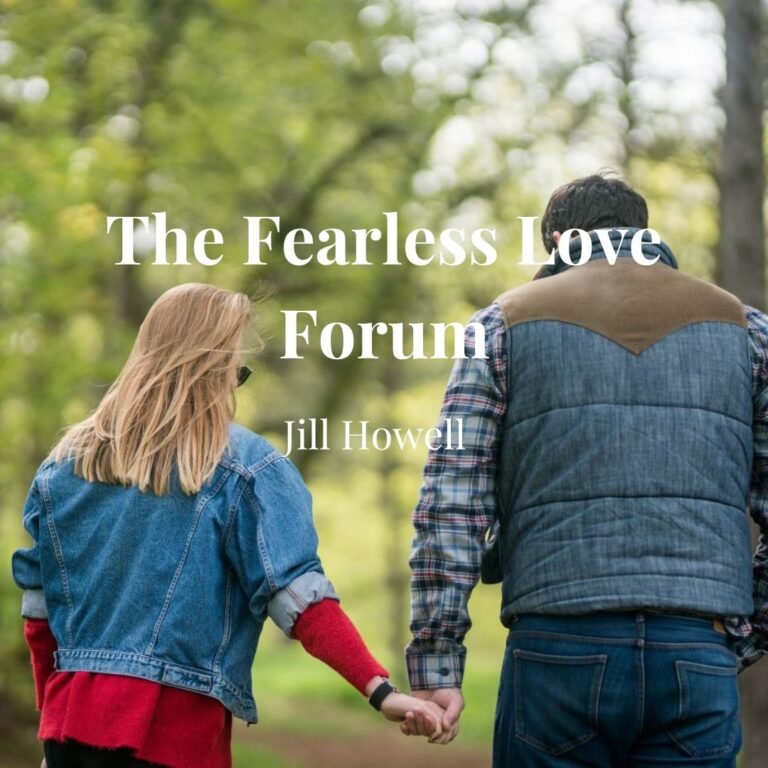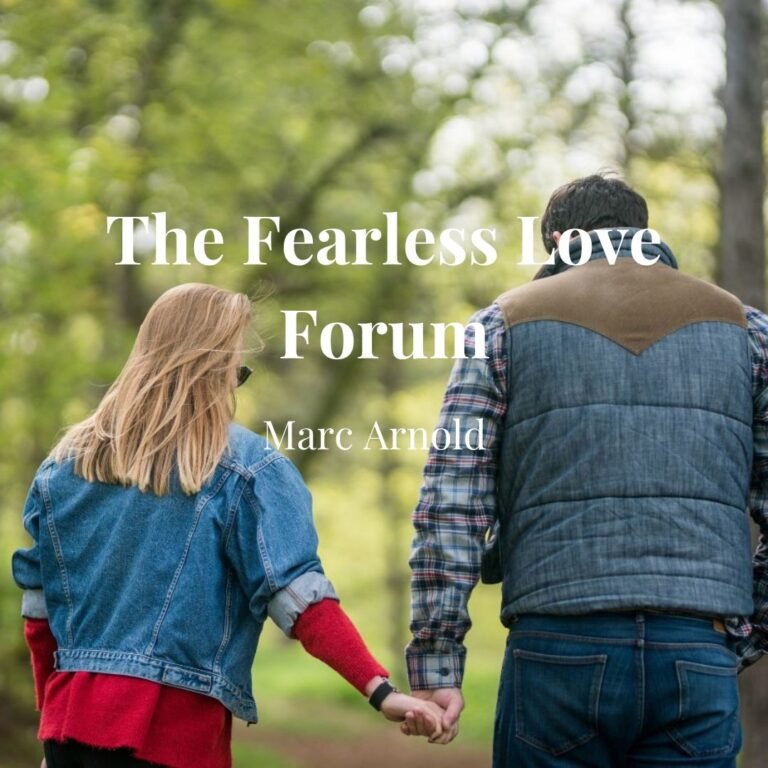Watch the full interview on Youtube here or on our website here.
In this fourth episode of the Fearless Love Forum, I have an enlightening conversation with Ali Gonçalves, founder of Four Elements Retreat in Portugal. Ali is an experienced feel-good coach and a Rapid Transformational Therapy (RTT) practitioner. She shares her inspiring journey of self-discovery, which spans over a decade and includes yoga, coaching, self-development, and significant transformations through motherhood and marriage.
Ali talks about the philosophy and activities of the Four Elements Retreat, which emphasizes a deep connection with nature. The retreat integrates the four elements—earth, water, air, and fire—by utilizing a large garden for food production, proximity to the sea, and the natural landscape of Portugal. Attendees engage in yoga, nature walks, and local explorations, aiming to leave relaxed and rejuvenated.
We delve into the topic of unresolved trauma, discussing how it manifests in various forms and affects relationships. Ali explains the importance of setting healthy boundaries and offers practical advice on enhancing well-being through gratitude, mindfulness, and connecting with nature.
Transcript for Healing Trauma Through Healthy Boundaries: Ali Goncalves on the Fearless Love Forum
**David:**
Well, hello everyone, welcome back to the Fearless Love Forum. My name is David W. Stock and today I have Ali Goncalves with me. Ali is the founder of Four Elements Retreat in Portugal. Ali is a feel-good coach, so we’re going to talk a little bit about that later. And Ali is also a Rapid Transformational Therapy Practitioner. So, Ali, welcome to the forum and maybe you can just start by introducing yourself a little better than I did and tell us a little bit about yourself.
**Ali:**
Well, thank you very much for having me here. I think all the most important things that our viewers might be interested in, you’ve already mentioned. Maybe a little bit more private things about me. I’m living in Portugal now for almost six years. I am married to my husband Pedro, with whom I run the retreat here in Portugal. And we have a little son, Mateo, who is going to be three years old. And yeah, I’m on this self-discovery journey for probably around 10 years now with yoga, with coaching, with self-development, with rapid transformational therapy, by being a mother, big transformation, by having a relationship to my husband, big transformation. So yeah, I’m on this journey for a little while now, and yeah, I’m loving it, even though sometimes it’s challenging, I admit.
**David:**
Ali, do you want to tell us a little bit about the retreat, like the nature of the retreat, and kind of what that’s all about?
**Ali:**
Yeah, so we wanted to create a place that is connected to nature. That’s one of the reasons why we called it Four Elements Retreat, because we have a huge garden here where we produce a lot of our food. We cook vegetarian food from the ingredients of our garden. We’re close to the sea, so we also have the water element. It’s a bit windy sometimes here, so we also have a lot of air and of course the space, the vastness, the openness of the coastline here in Portugal. And of course, we also have sunshine, so the fire element, but we also look at body, mind, spirit, and soul, so also those four elements of our being and yeah, also things like sleep, nutrition, stress, exercise, some more practical kind of things as well. People are here for a week, so seven days, six nights, and spend the week together with us doing yoga, but also walks through our lovely area and little trips to explore a little bit of Portugal, small parts only, but yeah, it’s a beautiful country. I love to be here and I love being with all the people that come to us from all parts of the world and to see, you know, how they leave here relaxed, very charged and inspired.
**David:**
And it sounds really healing.
**Ali:**
Yes. Yeah, I think everyone takes something different from this retreat and everyone is at a different point of their journey. And yeah, I just love to be a part and yeah, help wherever I can help.
**David:**
I think that there’s a lot of unhealed or unresolved trauma in the world that we live in today, you know, for different reasons. Because what I see is that most people are unaware. They just kind of go on about their lives, just trying to survive. I’m just wondering if you can help us identify some of the signs that someone might be experiencing, may have experienced trauma in their past and they’re not aware that it’s still affecting them?
**Ali:**
Well, it can be in several forms and shapes if you have experienced trauma. Many people think that trauma is usually a major thing like experiencing war or a physical or mental abuse, but it doesn’t necessarily have to be like trauma with a capital T, I like to call that kind of trauma. It can be just a belief that we have formed during our childhood that can still run us nowadays and that is not useful anymore to us. We’re unaware that this belief is still running our day-to-day lives. And one of the symptoms, for example, could be for stressed women, that they identify their self-worth through their performance and that they feel that they have to do everything and that all this load kind of on them entirely. That can be an underlying belief there. It can be things that stress us, that maybe don’t stress other people, that can go back to trauma. It can also be difficult relationships in all shapes and forms again as well. Colleagues, family members, but also intimate romantic relationships, relationships to your children that can suffer from trauma and underlying beliefs. It can be self-sabotage, recurring self-sabotage or little self-esteem. It can be so many forms. It’s really case by case.
**David:**
The whole nature of this forum is from trapped in trauma to finding fearless love. On one hand, we have the trauma and on the other hand, we have the relationships. What are some common things that you see with how trauma affects different kinds of relationships?
**Ali:**
Yeah, if we go into the romantic relationships, for example, the people that we are attracted to can be also not good for us. For example, sometimes we are attracted to people that seem distant and then we get kind of obsessed to make them love us. You know, we get really obsessed about this one person, so we get really a little bit clingy maybe. And the more aloof the other person is, the more we feel attracted to them. That can be this unhealthy pattern in a relationship can go back to trauma. Same the other way around. If we are in a relationship and we feel that the other person is getting clingy or is getting too close to us, we might also distance ourselves and try to escape. That is another unhealthy form of bonding or attachment, which can also go back to trauma and underlying beliefs. So those are just two quick examples how trauma can affect our intimate relationships. And the same goes for other things like parenting, for example, whenever we enter into a new role in our life, in our subconsciousness, it opens a new folder. Like, for example, if we go from a relationship into a marriage, it opens the folder marriage. That’s why many times the relation between a couple changes after they get married, because it’s just another blueprint, kind of, that is open in our mind. And the same happens, for example, if we become parents, then we kind of remember what we have learned with our parents or while we were growing up with the people that were responsible for our education. But also what we saw, for example, in movies, in series, read in books, what society promotes, how an ideal mother, for example, has to be. And it’s really important that we become aware of what we believe a mother, a wife, a partner, a worker, co-worker should be like. And this awareness really helps us to see, OK, is that really me? Do I really want to be that way? Or is it just a role that is kind of imposed on me and is it really my free will and my choice to act that way?
**David:**
I don’t know about you but I have a really difficult time talking about relationships and roles without getting into boundaries and so because boundaries really are about the way that we relate to each other?
**Ali:**
Yeah I think boundaries are very important and it’s important again here to have awareness first about and clarity about what you want and why you want it. Not to give mixed messages to the person you are in relationship with, let it be your boss, let it be your co-worker, let it be your spouse or your children or any other person that you interact with. So I think clarity is really important to be clear what you really want or maybe just start with what you don’t want, you know, and then try to find out what you want instead. So I think this clarity and consciousness is really important. Also, to be a bit more objective about the way how you have been behaving. Because when we are not so conscious about our behavior and maybe didn’t dive yet into personal development, we just see our view. But of course, there is several sides to each story. So it really helps also to be conscious to zoom out a little bit and to see also how maybe another person can interpret your behavior. And then it’s really a basic, I think for every well-functioning relationship is to have an open and honest communication. So whatever you found out about yourself, the clarity that you have, the consciousness that you have, that you then communicate that to the person that you are in a relationship with, whatever relationship that might be. And then make sure that you communicate your needs and your boundaries in a neutral state, not when someone is already overstepping them because then usually we’re not able to communicate it in, let’s say, maybe a really nice way that the other person also can nicely agree to keeping the boundaries because then we’re already, you know, maybe not in some emotional state that we might also not choose the best, wisest words. Generally, people always recommend not to accuse the other person of something, but to start with I and speak about your own feelings and emotions. There is just one pitfall that sometimes people say, I feel that you never unload the dishwasher. And that’s a little bit tricky because, of course, you are also accusing the other person by starting with I. So just really stay to yourself and say, I really would love that we share unloading the dishwasher, just as a very simple everyday example. 50-50. And then also we have to be sure of what we’re going to do if the other person doesn’t respect the boundaries and maybe also communicate that depending on how brave the boundaries are. And then really stick to those boundaries because sometimes we kind of threaten by something but we don’t really want to go there
and we don’t really want to do it and then the other person oversteps our boundary and we don’t do anything about it which will not show the other person that what they’ve done now is not okay and I don’t mean that you immediately have to take drastic measures but I would suggest that you try to communicate it as lovingly patient and patiently as you can. And then of course, make sure that the consequences are being followed.
**David:**
Like, do you see examples of either they don’t have a boundary in place at all, or they’ve overdone it with the boundary. It’s too much. Do you see examples of both of those? How does that affect someone if they don’t have proper, well thought out boundaries in place?
**Ali:**
Yeah, I see it more common that people have difficulty setting boundaries and that’s again many times because of underlying beliefs. It many times goes back to low self-esteem, so that people, for example, have the underlying belief that they are not enough or not good the way they are and that they have to please others to receive their affection, their attention, their appreciation. And that because of this pattern, this underlying belief, they always do whatever the others want. They want to please the others, they want to be nice to the others, but they just totally forget about themselves. And then there is a situation where that crashes. For example, if you’ve been like a very dedicated mother, always doing everything for your kids, and then they move out, you’re gonna suffer from emptiness syndrome. You’re gonna not know what you’re gonna do now with all your life now that your children are not around. And that can really, yeah, bring a big crisis. Or if it’s during your job, it can lead to a burnout. There’s a lot of severe consequences and they usually don’t start as severe, but it’s a build-up situation. So it’s always useful to look what is underlying there, why we are doing certain things, to stop it before it gets to that point.
**David:**
And I can imagine that if someone is too strict with setting their boundaries, that they’re gonna have a rather lonely life, maybe.
**Ali:**
Yeah, but in my practice, I usually see the less boundaries, little boundaries, difficulties in setting boundaries much more.
**David:**
Well, do you find that it starts out that way, but then they kind of flip to the other side, the resentment builds up, and then one day they’re just like, you know, have this.
**Ali:**
Well, I think that’s also the attitude once in a while, you know, there’s nothing wrong with this. Sometimes it’s needed. I don’t feel that it happens too much, because usually, people really have to practice setting boundaries for a long time. It’s a bit like muscle training at the gym, you know, you don’t learn it from one day to the other and then you’ve mastered it. So you have to say no and set limits and be aware of your needs. That is sometimes already hard enough that people really find out what is it that they really need and be able to communicate that effectively. Because many times it’s something that they also haven’t learned during their childhood and many times teachers or parents, educators, they go over their needs. So they kind of learn that their needs are not important and not worth it to be heard. So it takes quite some practice and reassurance and training basically to start to set healthy boundaries. And I think many times when people start asking for things and setting boundaries, they are actually surprised how well it goes. Of course, there is also a backslash. Like, you know, there is not always being positively received from our environment because our environment is used to us being a certain way. So if we change, they also have to change and they sometimes don’t want that, but in general, I think people have very positive experiences with it and it sometimes can even lead to more connection, more intimacy in the relationships because we are also, I would say better presence if we care for ourselves, and if we show up for ourselves. If we are more balanced, we can also bring more quality of us into our relationships with others. It’s like they always talk about this oxygen masks in the airplane. It’s basically if we know what we want and we follow that and we take care of ourselves, we can also show up for other people in a better way.
**David:**
That is 100% my experience that healthy boundaries create more intimacy. Boundaries are kind of like the real life form of self-love. We talk about self-love all the time and different kinds of things to do. There’s all kinds of like um especially for women they talk about like having a bubble bath and stuff like that but it it goes home so so much deeper than that and yeah 100 my my personal experience in in my relationships has been that where there’s healthy boundaries there’s more intimacy I want to kind of switch gears a little bit. I hope you don’t mind because we just we just touched in in your intro a little bit, but I know you already know this about me, but I’m a big fan of hypnosis and hypnotherapy and as a modality and the my work with any was extensively extensively around hypnosis. And so I know that you’re an RTT practitioner rapid transformational therapy. I’m a big fan of the creator of that method and I wonder if you can just kind of talk a little bit about what is RTT? What is it all about? And, and how, how do you work it into your practice?
**Ali:**
Yeah, and I really love the method as well. Marissa Peer is the inventor of the transformational therapy. I really like the method because it combines hypnotherapy with cognitive behavioral therapy with NLP with a lot of other tools and it just uses hypnosis as the basis. So when people get into this deep relaxation with what hypnosis really is, sometimes people get a bit scared about it, but it’s actually a very natural state of being. We can dig a bit deeper into the subconscious mind and check what are the underlying beliefs and patterns that are causing the issues that my clients face during their lives now, because we already touched on it a bit during the conversation. Many of those beliefs and patterns are created when we are little children in the first seven years of our lives, usually, so we never really update those beliefs. And while they are formed to be beneficial for us in that time, they might not be beneficial for us anymore later in our lives, and we never really are aware that they are there. But that’s always like that image of the iceberg, you see the top, but the big part, our subconsciousness and unconsciousness is below the surface. And RTT is a great tool to access that subconscious field and yeah, to rewire and reprogram old beliefs and patterns, and change them to whatever we want to achieve now, today, instead.
**David:**
Yeah, yeah, that’s excellent. Excellent. I could talk about the subconscious mind all day, for sure. I really tell people that the subconscious mind just really just wants to keep you alive. It’s not really that concerned about your quality of life. And all it really knows is that whatever we did yesterday must have worked because we’re still alive. So heart was beating yesterday, check. Let’s get that going. Breathing, check. You know, it’s kind of like all systems go kind of thing and it just flips on all the programs and away you go. And if it just so happens that, you know, you argued with your spouse every day for the last six weeks, there’s a pretty good chance you’re going to argue with your spouse again today. There’s some parts, and people don’t really, really grasp the, because you don’t get to be aware of it all the time. It’s it’s like all of the bodily functions that are being controlled by that same part of the mind are like it like, like, how is your spleen functioning right now you have no idea you have no awareness of that there’s no like, it’s not in your conscious mind at all. There’s a few that are, you can sort of interfere with consciously, like breathing, for example, you can stop breathing, but you can’t stop breathing for long. And if you ever want a demonstration of how the subconscious mind comes in and takes over, just stop breathing, because the first thing you’ll notice is that you start to get a little anxious and a little panicky, and you really, really want to take a breath. You’re getting all these messages from your body saying, you need to breathe, you need to breathe you need to breathe and if you ignore them the more um it takes an enormous amount of conscious energy to ignore that and if you’re successful in ignoring it eventually the subconscious mind flips the light switch and you’re out.
**Ali:**
Yeah, yeah it’s really important what you’re saying because uh that kind of bridges the gap between our previous conversation and trauma, and the subconscious mind is like, if this, if this underlying trauma, maybe we cannot explain it rationally with our conscious mind. And we try to change behavior, behaviors and habits on a conscious level, we try to suppress the emotional part, the traumatic part that is in our subconsciousness is almost like keeping an air balloon, you know, under water all the time. It’s costing you enormous effort, enormous strength to keep the balloon under water. But no matter what you’re gonna do, and there might be just a little distraction and boom, it comes up again. So that’s why hypnotherapy can be very useful to look at the actual balloon instead of trying to keep it under water.
**David:**
Yeah, yeah, excellent. Well, we went pretty deep here today and I kind of want to go out on a happy note. So you have to tell me about being a feel-good coach and what is that all about? What can we do just to experience more positive emotions?
**Ali:**
Yeah, I chose to call myself a feel-good coach for busy bees or busy women because I used to be like that and I
noticed that you can do whatever you want, you can create the life that you’ve always wanted around you. If you don’t take care of what’s inside of you and your mindset, your subconscious mind, the patterns that run you, you’re not going to be happy no matter what happens around you. So there is a lot of tools that you can do to bring again joy and lightness into your life and not to take everything so serious and to feel heavy and that there’s so much load on your shoulders. So I would really like to bring back the joy into people’s life and just enjoy the life that we have here on Earth. And there’s a lot of tools that you can use and maybe I’ll just name a few now that then, yeah, each of our viewers can explore and try if one works maybe better for them than another. But I think it’s one of your favorite tools as well is gratitude. I would make it a point to practice gratitude every day, either right away in the morning to set the mode for the day or at night before you go to sleep. You can even take a minute during your day just to focus on something that you’re grateful for. It can be one thing. It can be just your cup of tea or coffee at that time just to be present and feel really the feeling of gratitude. Same would be meditation or mindfulness. I think it’s also a really great tool. And for everyone who’s busy, it doesn’t have to be sitting in silence for 60 minutes in a cross-legged position. It can be just mindfully enjoying your meal, your coffee, or even washing the dishes, you know, just feel really feel the soapy water, feel maybe the grease on the plate you’re washing, you know, just be mindful, be present in the moment and just shut off all whatever is going on in our monkey mind. Breath is a great tool, exercise is a great tool, going outside is amazing, connect with nature, feel awe for nature, you know, the power of the sea, the mountains, the forests, there’s so much to admire in nature and yeah we just it just puts whatever is going on in us a little bit in perspective again we forget about it we can connect putting your hand into the soil is super grounding there’s a lot that you can do and I think in general it’s also great to connect with like-minded people like find yourself a tribe people who support you and that can be also a coach or a therapist if you feel that there are no people around you in your friend group or your family that have your back, it can be professional help. I think there’s nothing wrong about asking for help and to get the support that you need and deserve. And yeah, we talked about setting boundaries, delegating, saying no. I think those are already a bunch of things and just clarity of what you want, what you need, and not to forget also about what gives you joy and then try to incorporate that as much as possible in your everyday life. And it can be small things.
**David:**
Yeah. Can you give me some examples from your own life? Like what gives you joy?
**Ali:**
I really enjoy spending time with my little son. He really helps me to dance and laugh much more. A trampoline is great. Just jumping around and feel alive and happy and joyful. I really also love to go into the sea. It’s quite cold here, but that gives you really your present and in the moment. And it makes you feel very alive. Yeah, some examples.
**David:**
Yeah, yeah. Excellent. Well, Ali, I can’t thank you enough for doing this with us. And I understand that you have something extremely valuable to give away here to anybody that’s watching. And yeah, go ahead and tell them, tell them about it.
**Ali:**
Yeah. I just invite everyone who is called to just click on the link below and have a free 30 minute mentoring call with me to assess your situation. And maybe to give you some tips on how to integrate more joy and lightfulness into your life and to see what I can do for you. And I’m looking forward to talk to anyone who would like to.
**David:**
Yeah, yeah, that’s, that’s amazing. So we have, we can find Ali on Instagram as well, that’s down below, and on her website as well. And I have links to all of that, probably just right under the video and so Ali thank you so much for being here today and I hope we get to do this again in the future.
**Ali:**
Yeah, thank you very much for having me. It was a pleasure talking to you.





